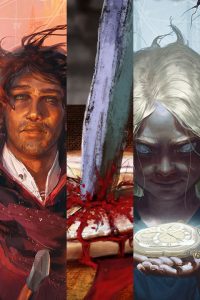 A couple of years ago, I put the finishing touches on the third book of a time travel/epic fantasy trilogy called the Islevale Cycle. I loved the Islevale books then, and I remain incredibly proud of them today. I think they represent some of my finest work, and if you enjoy epic fantasy, OR time travel, OR (best of all) both, I recommend you pick the books up and give them a try. (The books are called Time’s Children, Time’s Demon, and Time’s Assassin.)
A couple of years ago, I put the finishing touches on the third book of a time travel/epic fantasy trilogy called the Islevale Cycle. I loved the Islevale books then, and I remain incredibly proud of them today. I think they represent some of my finest work, and if you enjoy epic fantasy, OR time travel, OR (best of all) both, I recommend you pick the books up and give them a try. (The books are called Time’s Children, Time’s Demon, and Time’s Assassin.)
As much as I love them, though, I also have to admit that they nearly destroyed me. I have never struggled so much with any books, and I hope I never will again. Part of the problem was simply the ambition of the project. Sprawling epic fantasies are hard to write. One must weave together multiple plot threads and write from the perspectives of numerous point of view characters. Time travel is even harder to write, first because one must keep track of several time lines at once, second because any plot point is potentially reversible (If time traveling characters are unhappy with events, what’s to keep them from going back and changing them?), and third, because in my story I had more than one iteration of several characters existing simultaneously. (At one point in book 3, I had four or maybe five iterations of the same character inhabiting my world.)
As you might expect, combining the challenges of writing epic fantasy with the difficulties inherent in writing time travel only serves to compound all of those issues. These books would have been hard to write under any circumstance. But here’s the thing: For some reason, I could not outline any of the Islevale books. I don’t know why. To this day I remain mystified. But yeah, I had to write all three books without any advance outline beyond my vague sense of where the books needed to go. The books turned out really well, but the process was excruciating.
What is the point of this?
Well, once I finished the last Islevale novel and worked with the folks at Falstaff Books to shepherd it through production and publication, I needed a new project that would be Different, and Straight Forward, and Directed.
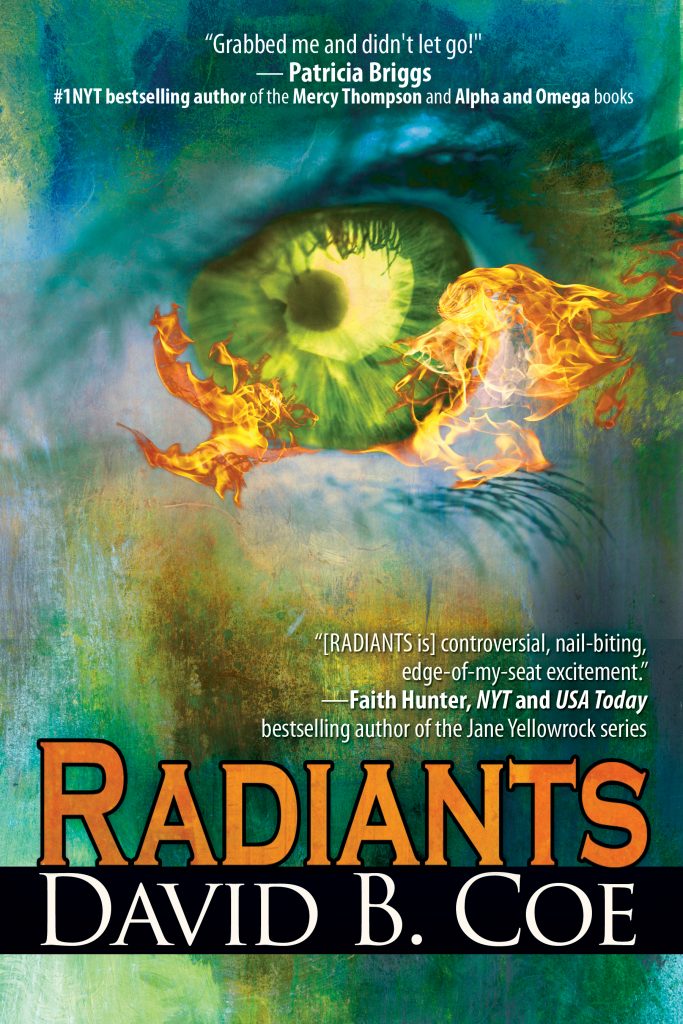 And that next book turned out to be Radiants.
And that next book turned out to be Radiants.
Radiants, a supernatural thriller, comes out from Belle Books on Friday (yes, THIS Friday) October 15th, and this “little” book, which I thought of as a sort of creative palate cleanser, has turned out to be far, far more.
Yes, it is different from the Islevale books, and it is quite directed. But it is deceptive in its “simplicity.” It is firmly rooted in our real world, and deals with social issues of weight and emotional power. It has fewer point of view characters and concentrates to a far greater degree on a single narrative thread. As a result, it is fast-paced. Like breakneck. And it includes some of the deepest, most satisfying character work I’ve done. (In fact, in this regard, I believe it might be exceeded by its sequel, Invasives, which will be out in another few months.)
So what makes Radiants a “supernatural thriller,” as oppose to a fantasy of some sort? Partly, it’s that pacing I mentioned, and partly it’s the real world setting and the fact that the speculative fiction element of the story is limited and very specific. And that was the appeal of writing the book. After creating a world whole-cloth for the Islevale series, I wanted to remain firmly fixed in our world for the new project. I wanted my characters to deal with issues that impact us in our day-to-day lives. I wanted them to speak as we do, to think and feel and interact as we do. In short, I wanted the story to be utterly relatable.
It would be easy to ascribe this to something pandemic-related — a need for normality, say, or some recognition that we don’t have to create an imagined world to come up with situations that are ________ . . . insert your preferred word here: Frightening? Disorienting? Surreal? As it happens, though, I completed my first draft of the book in February 2020, just before the current unpleasantness hit. [Invasives, the second Radiants book, is much more a reaction to the pandemic, as well as the personal difficulties my family and I have faced in recent months.]
Radiants really was a response to my creative needs at the time. No more, no less. It is the book I needed to write next. My lead characters presented themselves to me, along with their fraught and frantic circumstances, and I simply wrote. In this sense, Radiants might be the most organic book I’ve ever written. I had no marketing strategy for it; hell, for the longest time, I didn’t even know how to classify the story. I didn’t know if I was writing something for myself, for the sheer joy of it, or if it would turn out to be something I could sell and publish. I had a story to write and I wrote it.
For that reason alone, I love this book. And I am very hopeful that you will, too.










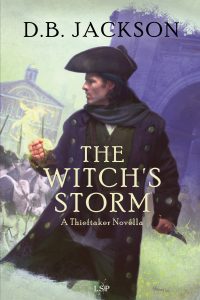 Today is release day for “The Witch’s Storm,” the first installment in my new trilogy of Thieftaker novellas,
Today is release day for “The Witch’s Storm,” the first installment in my new trilogy of Thieftaker novellas, 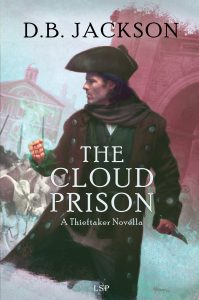 The fact is, though, as many of you already know, this release comes at a difficult time for my family and me. I have only recently returned to social media after a much-needed hiatus, and while I have adjusted to the new realities we face, they weigh on me still. And so I find myself in the position of wanting to be enthusiastic about the new stories, but also NOT wanting to be falsely positive and happy-go-lucky.
The fact is, though, as many of you already know, this release comes at a difficult time for my family and me. I have only recently returned to social media after a much-needed hiatus, and while I have adjusted to the new realities we face, they weigh on me still. And so I find myself in the position of wanting to be enthusiastic about the new stories, but also NOT wanting to be falsely positive and happy-go-lucky.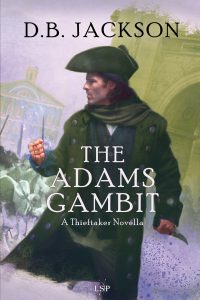 There is, of course, a larger point here. As I say, other writers deal with these questions, too. Really, all of us do. Part of being a professional in any field is being able to set aside the personal to meet our work obligations. We compartmentalize. Our emotions have their time and place, as do the qualities that make us good at our jobs. I am married to someone who excels at compartmentalizing. I am just okay at it. I can set aside my worries, fears, sadness, etc. and write for hours at a time. As long as I remain alone, in my office, with just my plot lines and worlds and characters, I’m fine.
There is, of course, a larger point here. As I say, other writers deal with these questions, too. Really, all of us do. Part of being a professional in any field is being able to set aside the personal to meet our work obligations. We compartmentalize. Our emotions have their time and place, as do the qualities that make us good at our jobs. I am married to someone who excels at compartmentalizing. I am just okay at it. I can set aside my worries, fears, sadness, etc. and write for hours at a time. As long as I remain alone, in my office, with just my plot lines and worlds and characters, I’m fine.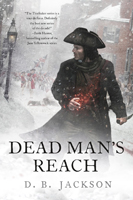 DBJ: There was a lot to work with actually. On the one hand, the trials of the soldiers and their captain were a huge deal. Think of all the big trials we’ve had in recent history — the way they captivate the public — and then magnify that about a hundred times. The Boston Massacre was a huge, huge deal throughout the colonies, but in Boston in particular. It’s easy to forget that the population of the city was only about 15,000 at this time. So while “only” five people died that night in March, chances are that if you lived in Boston, you’d had some contact with at least one of the victims. Add to that the fraught political climate of the time and you have a recipe for a lot of tension. Plus, as the title of the first novella suggests, right before the trial began, Boston was hit by a hurricane. Now, I have adopted the storm for my own narrative purposes and added a magical element. But the fact is, there was a ton going on, historically speaking, and I was able to work most of it into the novellas.
DBJ: There was a lot to work with actually. On the one hand, the trials of the soldiers and their captain were a huge deal. Think of all the big trials we’ve had in recent history — the way they captivate the public — and then magnify that about a hundred times. The Boston Massacre was a huge, huge deal throughout the colonies, but in Boston in particular. It’s easy to forget that the population of the city was only about 15,000 at this time. So while “only” five people died that night in March, chances are that if you lived in Boston, you’d had some contact with at least one of the victims. Add to that the fraught political climate of the time and you have a recipe for a lot of tension. Plus, as the title of the first novella suggests, right before the trial began, Boston was hit by a hurricane. Now, I have adopted the storm for my own narrative purposes and added a magical element. But the fact is, there was a ton going on, historically speaking, and I was able to work most of it into the novellas. DBJ: Definitely. The fact is, I’m probably better known for Thieftaker than I am for anything else I’ve published, either as D.B. Jackson or as
DBJ: Definitely. The fact is, I’m probably better known for Thieftaker than I am for anything else I’ve published, either as D.B. Jackson or as 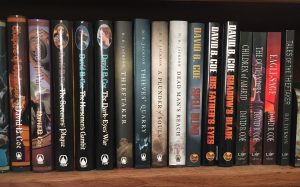 As you might expect, I did a great deal of prep work for my various classes — I wouldn’t dream of entering settings like those if I weren’t armed to the teeth with talking points, notes, topics for discussion, etc. For one thing, I have a responsibility to my students, and I take is seriously. And, though I don’t think most people would know it to look at me and listen to me, I suffer from profound stage fright. That preparation is my armor, my spell of warding. If I prepare well, my thinking goes, I’m less likely to make a complete fool of myself. This doesn’t always work — I’m perfectly capable of looking and sounding like an idiot even when I’ve done my homework. Still, I think my strategy is sound, at least in theory…
As you might expect, I did a great deal of prep work for my various classes — I wouldn’t dream of entering settings like those if I weren’t armed to the teeth with talking points, notes, topics for discussion, etc. For one thing, I have a responsibility to my students, and I take is seriously. And, though I don’t think most people would know it to look at me and listen to me, I suffer from profound stage fright. That preparation is my armor, my spell of warding. If I prepare well, my thinking goes, I’m less likely to make a complete fool of myself. This doesn’t always work — I’m perfectly capable of looking and sounding like an idiot even when I’ve done my homework. Still, I think my strategy is sound, at least in theory…